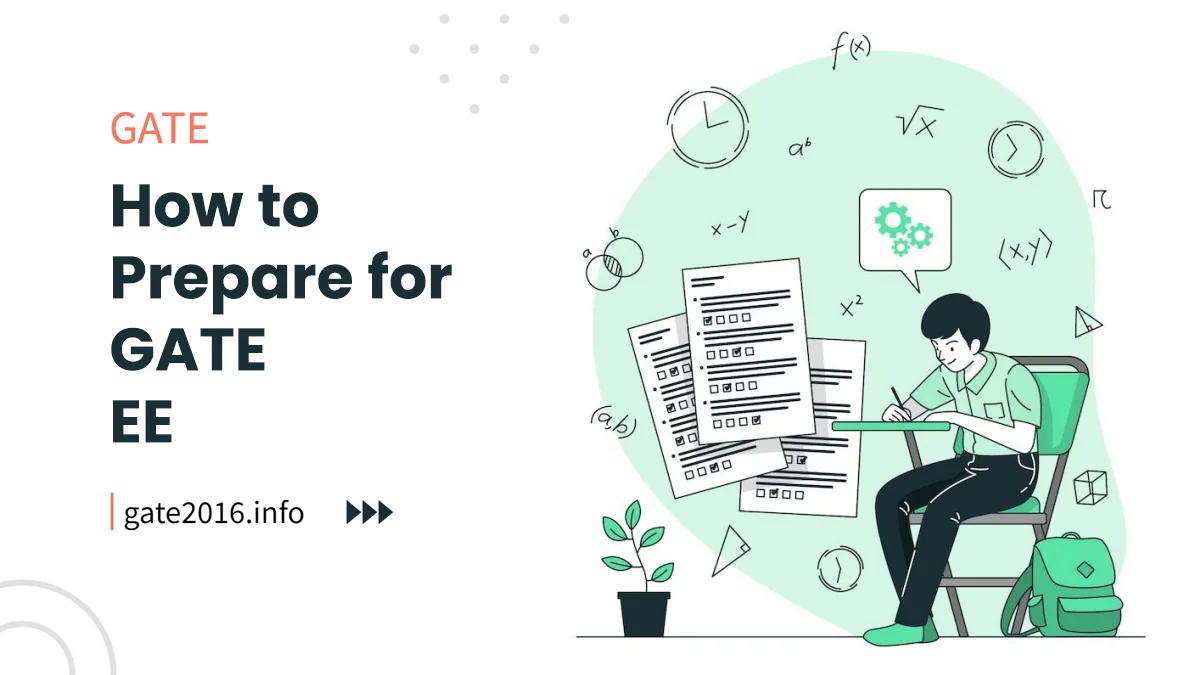Advertisements
Ratings

GATE 2024 EE Preparation – The Graduate Aptitude Test in Engineering (GATE) is a prestigious examination that serves as a gateway for aspirants seeking specialized education and rewarding career opportunities in the field of Electrical Engineering (EE).
Effective preparation is paramount to excel in the GATE EE exam.
This comprehensive guide outlines proven strategies and step-by-step instructions to help you prepare comprehensively and achieve success in the exam.
Contents
- 1. Introduction to GATE EE
- 2. Understanding the GATE EE Syllabus
- 3. Creating a Well-Structured Study Plan
- 4. Selection of Appropriate Study Materials
- 5. Mastering Core Concepts
- 6. Solving Numerical and Conceptual Problems
- 7. Reviewing Previous Years’ Question Papers
- 8. Taking Mock Tests
- 9. Effective Time Management Strategies
- 10. Implementing Revision Techniques
- 11. Staying Updated with Electrical Engineering Advancements
- 12. Managing Exam Stress
- 13. Final Weeks’ Preparation Strategy
- 14. Approaching Exam Day Confidently
- 15. Reflecting on the Exam and Planning Ahead
- Conclusion: Excelling in GATE Electrical Engineering
- Additional Resources and References
- GATE Electrical Engineering Guidance
- GATE Electrical Engineering Preparation FAQs
- GATE Total Information & Guidance
1. Introduction to GATE EE
GATE EE is a prominent examination for individuals aspiring to specialize in electrical engineering.
A well-structured preparation plan is essential to ace the GATE EE exam and contribute significantly to the field.
2. Understanding the GATE EE Syllabus
To prepare effectively, it’s crucial to understand the comprehensive GATE EE syllabus.
Let’s break down the syllabus into subjects and key topics:
Table 1: GATE EE Syllabus Breakdown
| Subject | Key Topics |
|---|---|
| Engineering Mathematics | Complex numbers, Differential equations, Linear algebra |
| Electric Circuits | Circuit analysis, Network theorems, Transients |
| Electromagnetic Fields | Gauss’s law, Maxwell’s equations, Transmission lines |
| Signals and Systems | Laplace transforms, Fourier transforms, Z-transforms |
| Electrical Machines | Transformers, DC machines, Induction motors |
| Power Systems | Load flow analysis, Fault analysis, Protection |
| Control Systems | Transfer functions, State-space representation |
| Electrical Measurements | Measurement devices, Error analysis, Bridges |
3. Creating a Well-Structured Study Plan
Developing a well-structured study plan is the foundation of effective GATE EE preparation.
Organize your study plan by allocating time to different subjects and topics based on their significance and complexity.
Table 2: Sample Study Plan
| Week | Subjects/Topics | Time Allocation |
|---|---|---|
| 1-2 | Engineering Mathematics | 10 hours/week |
| 3-4 | Electric Circuits | 12 hours/week |
| 5-6 | Electromagnetic Fields | 15 hours/week |
| 7-8 | Signals and Systems | 10 hours/week |
| 9-10 | Electrical Machines | 12 hours/week |
| 11-12 | Power Systems | 8 hours/week |
| 13-14 | Control Systems | 8 hours/week |
| 15-16 | Electrical Measurements | 10 hours/week |
4. Selection of Appropriate Study Materials
Choosing the right study materials is pivotal for comprehensive GATE EE preparation.
Utilize a combination of textbooks, online resources, video lectures, and mock tests for a well-rounded approach.
Table 3: Recommended Study Resources
| Subject | Books | Online Resources |
|---|---|---|
| Engineering Mathematics | “Higher Engineering Mathematics” by B.S. Grewal | NPTEL’s Engineering Mathematics courses |
| Electric Circuits | “Electric Circuits” by James W. Nilsson | Coursera’s Electric Circuits courses |
| Electromagnetic Fields | “Engineering Electromagnetics” by William H. Hayt | Khan Academy, Electromagnetic Fields Tutorials |
| Signals and Systems | “Signals and Systems” by Alan V. Oppenheim | NPTEL’s Signals and Systems courses |
| Electrical Machines | “Electric Machinery Fundamentals” by Stephen J. Chapman | Coursera’s Electrical Machines courses |
| Power Systems | “Power System Analysis” by Hadi Saadat | NPTEL’s Power Systems courses |
| Control Systems | “Modern Control Engineering” by Katsuhiko Ogata | Khan Academy, Control Systems Tutorials |
| Electrical Measurements | “Electrical and Electronic Measurements” by A.K. Sawhney | NPTEL’s Electrical Measurements courses |
5. Mastering Core Concepts
Building a strong foundation in core electrical engineering concepts is imperative.
Focus on fundamental principles within each subject:
Table 4: Mastering Core Concepts
| Subject | Key Concepts |
|---|---|
| Engineering Mathematics | Matrix algebra, Eigenvalues, Differential equations |
| Electric Circuits | Kirchhoff’s laws, Network theorems, Transient analysis |
| Electromagnetic Fields | Faraday’s law, Maxwell’s equations, Waveguides |
| Signals and Systems | System properties, Convolution, Fourier analysis |
| Electrical Machines | Machine types, Operating principles, Efficiency |
| Power Systems | Load flow analysis, Fault analysis, Protection |
| Control Systems | Transfer functions, Stability analysis |
| Electrical Measurements | Measurement techniques, Error analysis |
6. Solving Numerical and Conceptual Problems
Balancing numerical problem-solving skills with conceptual understanding is crucial.
Practice problems related to:
- Electric Circuits: Solving circuit equations, analyzing network theorems.
- Electromagnetic Fields: Calculating electric and magnetic fields, understanding wave propagation.
- Power Systems: Performing load flow analysis, fault calculations.
- Control Systems: Analyzing stability, transient response, and frequency response.
7. Reviewing Previous Years’ Question Papers
Solving previous years’ question papers provides insights into question patterns, difficulty levels, and exam trends:
Table 5: Benefits of Solving Previous Years’ Papers
| Benefit | Description |
|---|---|
| Understand Question Types | Identify common question patterns and formats |
| Time Management | Practice completing the paper within time |
| Exam Pattern Familiarity | Get comfortable with GATE question patterns |
| Self-Assessment | Evaluate your preparation level and progress |
8. Taking Mock Tests
Taking mock tests under simulated exam conditions is vital for building confidence and refining time management:
Table 6: Benefits of Taking Mock Tests
| Benefit | Description |
|---|---|
| Exam Simulation | Replicate the actual exam environment |
| Time Management Improvement | Enhance time allocation skills |
| Confidence Building | Boost your confidence before the real exam |
| Identifying Weak Areas | Pinpoint areas requiring further attention |
9. Effective Time Management Strategies
Effective time management during the exam is pivotal. Develop a strategy to allocate time to different sections:
Table 7: Time Management Strategy
| Section | Recommended Time Allocation |
|---|---|
| General Aptitude | 15 minutes |
| Verbal Ability | 10 minutes |
| Subject-specific Sections | 75 minutes each |
10. Implementing Revision Techniques
Regular revision is essential for retaining information. Utilize structured techniques to reinforce your understanding:
- Revision Schedule: Allocate time for revisiting key topics regularly.
- Concise Notes: Create summarized notes and flashcards for quick review.
11. Staying Updated with Electrical Engineering Advancements
Staying current with the latest advancements in electrical engineering is vital:
- Follow Industry Journals: Subscribe to reputable electrical engineering journals.
- Engage in Technical Forums: Participate in online discussions to learn about the latest trends.
12. Managing Exam Stress
Effective stress management is crucial for maintaining focus during preparation:
- Relaxation Techniques: Practice mindfulness, meditation, and deep breathing.
- Balanced Routine: Incorporate relaxation, exercise, and mindfulness into your study routine.
13. Final Weeks’ Preparation Strategy
As the exam date approaches, intensify revision of key topics:
- Focused Revision: Allocate more time to challenging subjects.
- Additional Mock Tests: Simulate exam conditions with extra practice tests.
14. Approaching Exam Day Confidently
On the exam day, stay composed:
- Read Instructions Carefully: Understand question patterns and instructions.
- Effective Time Allocation: Allocate time wisely to different sections.
15. Reflecting on the Exam and Planning Ahead
Evaluate your performance and plan your next steps:
- Performance Analysis: Identify strengths and areas for improvement.
- Future Planning: Decide whether to pursue further studies or career opportunities.
Conclusion: Excelling in GATE Electrical Engineering
Preparing for GATE Electrical Engineering demands dedication, meticulous planning, and a structured approach.
By following this comprehensive guide, aspirants can enhance their chances of performing exceptionally well in the examination and contributing significantly to the field of electrical engineering.
Additional Resources and References
For additional resources and references, explore the recommended textbooks, online courses, technical journals, and practice papers mentioned in this guide.
These resources will further enhance your understanding and preparation for the GATE EE exam.
GATE Electrical Engineering Guidance
- How to Prepare for GATE Electrical Engineering: A Comprehensive Guide
- GATE EE Syllabus 2025: Electrical Engineering
- GATE 2025 Books: Electrical Engineering
- GATE EE Previous Year Solved Papers – (2023-1991)
GATE Electrical Engineering Preparation FAQs
What is GATE Electrical Engineering (EE)?
GATE EE is an examination conducted by the Indian Institute of Technology (IIT) for admission into postgraduate programs in Electrical Engineering and related fields.
It assesses candidates' knowledge and understanding of electrical engineering concepts and serves as a gateway to higher education and career opportunities in this field.
What are the important subjects to focus on for GATE Electrical Engineering preparation?
Key subjects to focus on include electrical circuits, electromagnetics, power systems, control systems, electronics, and digital signal processing.
The GATE syllabus for Electrical Engineering covers a wide range of topics, so ensure you have a strong foundation in these areas.
How should I prepare for the GATE EE exam?
Effective preparation involves creating a study plan based on the GATE syllabus. Use standard textbooks, reference materials, and online resources for each subject.
Practice solving previous years' question papers and mock tests to become familiar with the exam pattern and improve your problem-solving skills. Additionally, work on numerical problem-solving and time management.
Are there any recommended books or resources for GATE Electrical Engineering preparation?
Yes, some recommended books and resources include:
- 'Electric Circuits' by James W. Nilsson and Susan Riedel
- 'Electromagnetic Field Theory Fundamentals' by Bhag Singh Guru and Hüseyin R. Hiziroglu
- 'Power System Analysis' by Hadi Saadat
- 'Control Systems Engineering' by Norman S. Nise
- Online courses and lecture videos from reputable institutions and platforms like NPTEL and Coursera.
What is the exam pattern for GATE Electrical Engineering, and how should I approach it?
GATE EE typically consists of multiple-choice questions, multiple-select questions, and numerical answer type questions.
Questions cover various aspects of electrical engineering, including theory and practical applications.
Start by answering questions you are confident about and manage your time efficiently. For numerical answer type questions, ensure precision in your answers.
Speed and accuracy, along with a strong understanding of fundamental electrical engineering concepts, are crucial for success in the exam.
Recent Posts
- AAI Through GATE 2024 – JE (Junior Executive)
- M Tech and MS Programs Through GATE and GRE: Navigating Postgraduate Options
- Job Opportunities After GATE 2024 in India: What You Didn’t Know!
- BSPHCL Through GATE 2024 – 40 AEE
Related Tags
how to prepare for gate electrical quora 2024, how to prepare for gate ee without coaching 2024, gate preparation tips for ee by toppers 2024, gate ee syllabus 2024, important topics for gate electrical engineering 2024, study material for gate electrical engineering 2024, important subjects for gate electrical 2024, gate electrical engineering questions 2024
| GATE (Reasoning & Aptitude & Maths) Books |
| GATE Guide Books |
GATE Total Information & Guidance
Click below given links to get further information.






